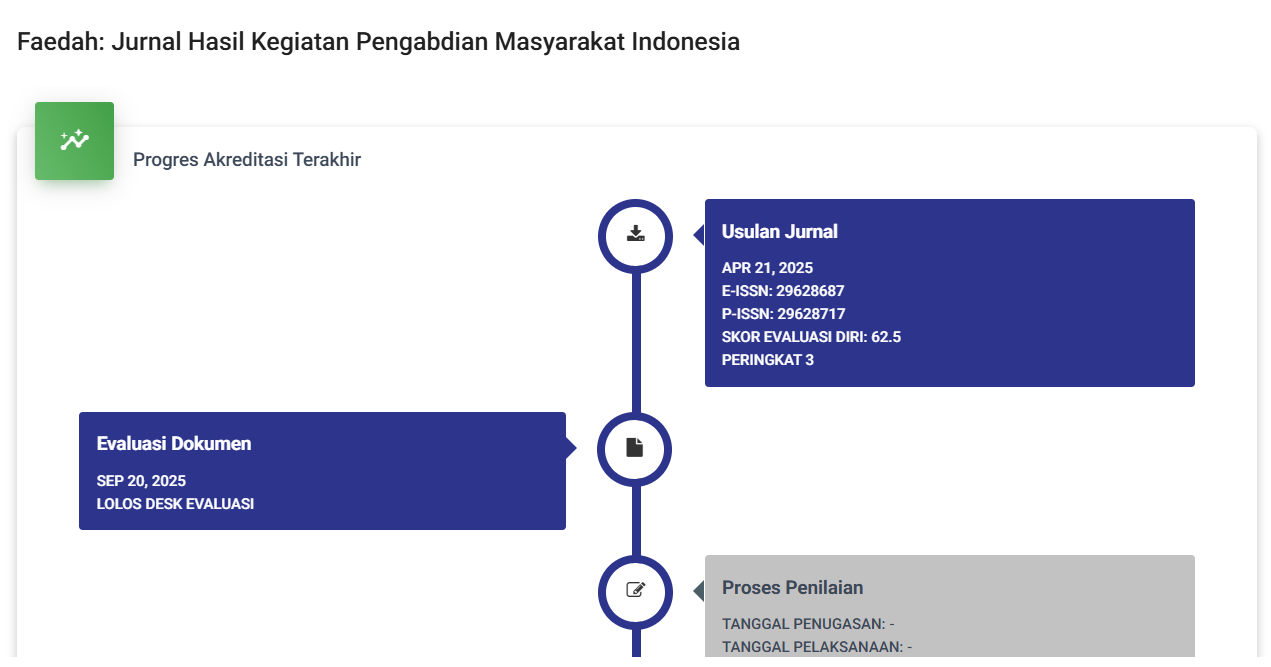Optimalisasi Pengelolaan Limbah Kelapa Melalui Pembuatan Briket Arang : Solusi Ekonomi dan Lingkungan di Desa Lampuyang
DOI:
https://doi.org/10.59024/faedah.v2i4.1081Keywords:
Kuliah Kerja Nyata, Community Empowerment, Waste Management.Abstract
Kuliah Kerja Nyata (KKN) or Community Service Program is a student engagement initiative designed to apply academic knowledge and skills in real-world contexts. The KKN program in Lampuyang Village, Teluk Sampit District, Central Kalimantan, conducted from July 15 to August 29, 2024, focused on converting coconut shell waste into charcoal briquettes. Lampuyang Village possesses significant potential in coconut plantation, but the waste from coconut, such as shells and husks, is often underutilized. This KKN aimed to provide a solution by training the village’s youth in making charcoal briquettes, thereby enhancing their skills and creating new, environmentally friendly business opportunities. Through a Participatory Action Research (PAR) approach, the program actively involved the community at every stage, from observation, planning, implementation, to evaluation. As a result, the program raised awareness about the economic potential of coconut waste, reduced environmental impacts from open burning, and encouraged the youth to engage in local economic development. This initiative is expected to offer long-term benefits to Lampuyang Village’s community and strengthen the role of students as agents of social change.
References
Ahmad, D. N., Setyowati, L., & Novianti, D. (2019). PKM pelatihan pembuatan briket kulit kelapa sawit dalam mewujudkan alternatif energi terbarukan. Jurnal Pengabdian Masyarakat Progresif Humanis Brainstorming, 2(2), 36-41.
Aziz, I. A., Hasbi, S., Munawar, W., Kurnia, T., Ibnu, A. R., Anwar, S., ... & Apriyana, M. (n.d.). Techno-economic analysis: Production of charcoal briquettes from coconut shell waste to improve the community economy.
Cain, T. (2014). The Sage handbook of action research: Participative inquiry and practice. Sage Publications.
Ferdi, F. (2023). Pemanfaatan limbah batok kelapa menjadi briket arang kelapa (Doctoral dissertation, Universitas Islam Indonesia).
Haryati, T., & Amir, I. (2021, September). Identifikasi karakteristik briket arang kelapa yang diminati pasar Arab Saudi dan prosedur ekspornya. In Forbiswira Forum Bisnis dan Kewirausahaan (Vol. 11, No. 1, pp. 39-57).
Hasanuddin, H., & Achmad, S. (2022). Pemberdayaan masyarakat melalui pengembangan SDGs desa untuk peningkatan kesejahteraan taraf hidup tumbuh merata. Jambura Journal of Husbandry and Agriculture Community Serve, 1(2).
Kusuma, N. I. P. R., Asriel, E. M., Prabowo, S. P. P., Muddin, I. N., & Turmudi, H. (2023). Peran mahasiswa dalam pembangunan desa melalui kuliah kerja nyata tematik di Desa Gentan Sukoharjo. Swarna: Jurnal Pengabdian Kepada Masyarakat, 2(3), 292-300.
Nustini, Y., & Allwar, A. (2019). Pemanfaatan limbah tempurung kelapa menjadi arang tempurung kelapa dan granular karbon aktif guna meningkatkan kesejahteraan Desa Watuduwur, Bruno, Kabupaten Purworejo.
Simamora, K. P., Lubis, K. S., Sembiring, R. P., & Rrangkuti, H. M. (2023). Utilization of coconut shell waste which is one of the sources of community income. Jurnal, 1(1), 86-91.
Tontinia, I. (2020). Pengaruh program kuliah kerja nyata terhadap pengembangan kompetensi sosial mahasiswa (Studi kasus mahasiswa KKN tematik Universitas Sebelas Maret periode XI).
Wijaya, M. R. (2022). Optimalisasi peran perguruan tinggi dalam pemberdayaan masyarakat. An Najah (Jurnal Pendidikan Islam dan Sosial Keagamaan), 1(1), 14-23.
Downloads
Published
How to Cite
Issue
Section
License
Copyright (c) 2024 Faedah : Jurnal Hasil Kegiatan Pengabdian Masyarakat Indonesia

This work is licensed under a Creative Commons Attribution-ShareAlike 4.0 International License.









